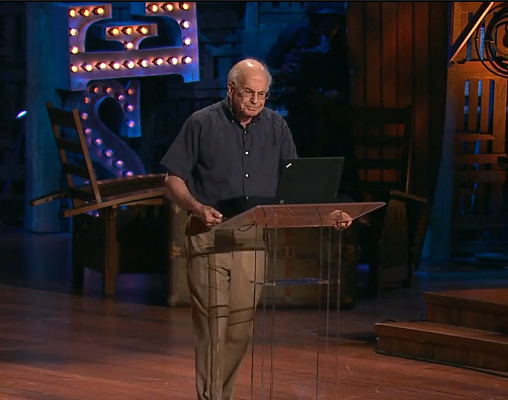From the point of view of the experiencing self, clearly, B had a worse time.
從經驗自我的角度來看,病人B顯然是比較難受的。
Now, what you could do with Patient A, and we actually ran clinical experiments,
那么病人A的情況該如何解釋,我們實際做了一個臨床試驗,
and it has been done, and it does work
當實驗完成時,我們也得到了預期的結果,
you could actually extend the colonoscopy of Patient A
事實上我們可以延長病人A的檢查時間
by just keeping the tube in without jiggling it too much.
從而減緩導管的震動程度。
That will cause the patient to suffer, but just a little and much less than before.
雖然病人還是會疼,但已減輕許多了。
And if you do that for a couple of minutes,
假如繼續這樣下去,
you have made the experiencing self of Patient A worse off,
你將會使病人A的經驗自我的感覺更糟,
and you have the remembering self of Patient A a lot better off,
但病人A的記憶自我則會感覺好多了,
because now you have endowed Patient A with a better story about his experience.
因為你給了病人A一個好一點的故事,一個好一點記憶他病痛經歷的故事。

What defines a story?
怎樣給故事定義好壞?
And that is true of the stories that memory delivers for us,
并且記憶告訴我們的故事是真實的,
and it's also true of the stories that we make up.
我們講述的故事也是真的。
What defines a story are changes, significant moments and endings.
故事的好壞取決于高潮時分及結尾時刻。
Endings are very, very important and, in this case, the ending dominated.
結尾是非常重要的,上面的這個故事就是由結尾所主導的。
Now, the experiencing self lives its life continuously.
現在,經驗自我延續這個生活經驗。
It has moments of experience, one after the other.
他也擁有片刻的經驗,一個接一個。
And you can ask: What happens to these moments?
你會問:“這些片刻怎么了?”
And the answer is really straightforward: They are lost forever.
答案很簡單:他們永遠消失了。











